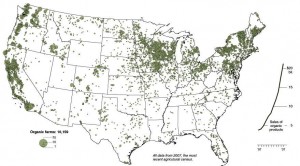- “The growing consensus among researchers is that multiple factors such as poor nutrition and exposure to pesticides can interact to weaken colonies and make them susceptible to a virus-mediated collapse.”
- “…breeding spring wheat specific to organic agriculture should be conducted on organically managed land.”
- “A project developing medicinal products from plants found in Kakamega forest, western Kenya, has transformed the livelihoods of nearby communities…”
Nibbles: Asparagus, Eels, ICT, Dingoes, Phoenix dactylifera, Apples, Bear-pit
- Liguria’s asparago violetto gets Slow Food treatment.
- “The bottom line is we just don’t know why they are struggling so badly.”
- Using mobile phones to treat plant pests and diseases in Uganda.
- Dingoes have positive effect on biodiversity.
- Date palm genome mapped.
- Boffins see the light, explain negative effect of fertilizers on biodiversity.
- Brogdale situation “better,” but for how long?
- Wait, Bern has a bear-pit?
Organic farms mapped
There are 10,159 organic farms in the US ((Or there were in 2007, the date of the most recent agricultural census.)) and, unlike farms in general, they are distributed around the country in a series of distinct hotspots. I know this because the NY Times did its usual wondeful graphics number on the USDA’s numbers. I wonder what Paul Krugman would have to say about these particular business clusters.

LATER: Oops, too fast on the old “Publish” button. If I’d waited to go live with the above until after browsing through my feed reader, I could have added that Food & Water Watch have a complementary map of factory farms in the US. Which I found out about via a story in the Atlantic Food Channel that was actually about something different, the global provenance of food.
LATER STILL: Alas, the map of organic farm distribution bears more than a passing resemblance to that for greed. Kinda.

Nibbles: James McWilliams, Flowering plant origins, Moon plant, Satellites
- “Should we be working to create local foodsheds in areas that have to import water in order to be fertile?” Dude, you had me at foodsheds.
- Endosperm “made human civilization possible.”
- First plant on moon a brassica?
- Eye in sky finds missing sweet potatoes.
- Can you think of a better way to use a rooftop than to grow rice on it and then to brew sake? Didn’t think so.
A tale of two countries
Straight.com ((Vancouver’s Online Source, no less.)) had a longish piece about GMOs a few days back. Normally I wouldn’t bother noting such an occurrence here. I’m bored with the whole debate, frankly. But the article actually strives for balance, which is too unusual to let pass without mention.